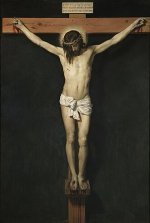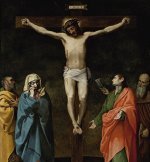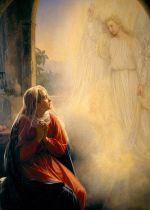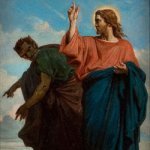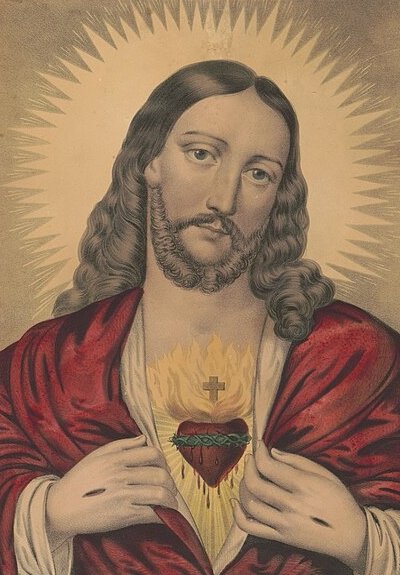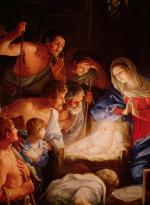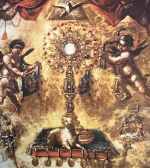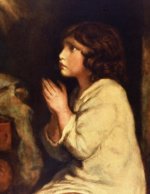THE NICENE CREED
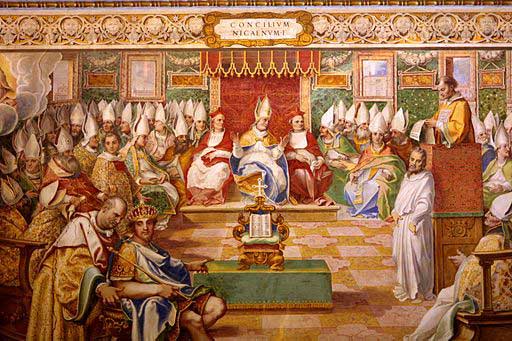 16th Century Vatican Fresco of the Council of Nicea
16th Century Vatican Fresco of the Council of NiceaTHE FIVE FIRST SATURDAYS IS A DEVOTION NEEDED NOW MORE THAN EVER! FIND OUT MORE HERE
THE SAINT MICHAEL PRAYER AND THE ROSARY
ARE ALSO POWERFUL PRAYERS TO HELP US THROUGH THESE VERY TURBULENT TIMES!
FATHER CHAD RIPPERGER HAS RELEASED A PRAYER FOR THE CONSECRATION OF THOSE GOVERNING TO THE BLESSED VIRGIN MARY
DETAILS (AND THE PRAYER ITSELF) HERE WITH AN UPDATED PRAYER TO OUR LADY HERE
HIGHLY RECOMMENDED! DELIVERANCE PRAYERS,
A BOOK FROM SENSUS TRADITIONIS PRESS
(A GREAT PUBLISHER HELPING US FIGHT OUR MANY SPIRITUAL BATTLES NOWADAYS)!
CHECK OUT OUR PODCAST PAGE AND OUR YOUTUBE CHANNEL FOR INSPIRING CONTENT
“Who do the crowds say that I am?” Jesus asks His disciples in Luke’s Gospel (Lk 9:20). His question took on a special significance three centuries later! The Nicene Creed we recite at Mass (also known more technically as the Niceo-Constantinopolitan Creed) helps us Catholics, and other Christians as well, answer it in a majestic way! It enhances the Apostles' Creed that we pray in the Rosary.
I believe in one God,
the Father almighty,
maker of heaven and earth,
of all things visible and invisible.
I believe in one Lord Jesus Christ,
the Only Begotten Son of God,
born of the Father before all ages.
God from God, Light from Light,
true God from true God,
begotten, not made, consubstantial with the Father;
through him all things were made.
For us men and for our salvation
he came down from heaven,
and by the Holy Spirit was incarnate of the Virgin Mary, and became man.
For our sake he was crucified under Pontius Pilate, he suffered death and was buried,
and rose again on the third day
in accordance with the Scriptures.
He ascended into heaven
and is seated at the right hand of the Father.
He will come again in glory
to judge the living and the dead
and his kingdom will have no end.
I believe in the Holy Spirit, the Lord, the giver of life, who proceeds from the Father and the Son,
who with the Father and the Son is adored and glorified, who has spoken through the prophets.
I believe in one, holy, catholic and apostolic Church.
I confess one Baptism for the forgiveness of sins
and I look forward to the resurrection of the dead and the life of the world to come. Amen.
Jesus told St. Peter when He established His church during his brief earthly ministry that the gates of Hell would not prevail against it (Mt 16:18). Not that they wouldn’t try!
Catholicism has battled numerous heresies in its 2000-year history. The Nicene Creed was written as a response to a big one that sprung up like a noxious weed in the 4th Century, the Arian Heresy!
The Arian heresy, concerning the nature of Christ’s identity, caused a great rift in the church in the 300s. It is named after Arius, a priest from Alexandria in Egypt who promulgated the idea that Jesus was created by God rather than being God.
This heretical notion was seductive to quite a few bishops and other members of the clergy both before (and sadly) after the Nicene Creed was first approved at the Council of Nicea in 325 AD.
John Henry Cardinal Newman, in his scholarly work Arians of the 4th Century, summed up the problem quite well when he wrote that “The fundamental tenet of Arianism was that the Son of God was a creature, not born of the Father, but, in the scientific language of the times, made 'out of nothing.' It thereby followed that Christ was not God but rather “a created semblance” of God.
Arius and his followers sought to deny Jesus’ essential divine attributes of being uncreated and eternal. Thus, going back to Cardinal Newman, the Arians were “willing to ascribe to the Son all that is commonly attributed to Almighty God, His name, authority, and power; all but the incommunicable nature or being (usia), that is, all but that which alone could give Him a right to these prerogatives of divinity in a real and literal sense.” In other words, Jesus might have Godlike attributes but he was in no way God!
It didn’t help matters that the church was still working out how to define the exact nature of God in the Trinity (one God in three persons) when Arius and his associates introduced this heresy sometime around 318 AD. How could Christianity be monotheistic if Jesus were God when we already had God the Father?
And further, how could the notion of there being only one God square with Jesus’ words that He and the Father were one (Jn 10:30)? Scriptural references such as these might have very well added to the confusion.
Still, besides providing the wrong way to clear up doctrinal or scriptural confusion, what was the appeal of Arianism? Author Rod Bennett, in his book The Apostasy That Wasn’t about the 4th century church, opined that Arius himself might have thought a good way to reconcile God the Father’s and Jesus’ relationship with monotheism was for Jesus to have been created. But there were others, such as the priest’s ally Bishop Eusebius of Nicomedia, who were thinking in more strategic, political terms.
Bennett writes that “Arianism was nothing more or less than a clever attempt to save paganism [italics in the original], to allow men to go on worshiping a creature rather than the creator as they had since time immemorial.”
They thought it would also make Christianity more acceptable to intellectuals and “a wide variety of otherwise hesitant Roman citizens.” A Jesus who was more like a photocopy of God could bring in the reluctant monotheists. And Pagans might be attracted to Jesus as a sort of demigod. Christ-lite did indeed have some appeal, then as now, over Christ the Light!
But trying to “sell” Christianity to the Roman Empire through Arianism had the potential to do much long term damage to our faith, despite any short term gains.
For if Jesus were merely created by God rather than being God Himself, eternally begotten and changeless, we’d be worshiping him as one of God’s creatures rather than the Creator.
(And, let’s face it, we all find ourselves worshiping creatures rather than our Creator at one time or another, be they ourselves, our lovers, our friends, or tragically in many cases our leaders, including more than a few tyrants over the centuries! That’s not counting all those golden calves (Ex 32:1-6) so many people give the worship due God alone, such as various cars, houses, clothes, valuables, and numerous status symbols among other possessions.)
The great English author Hillaire Belloc makes a good point about Arianism’s danger:
"Therefore, although it [Arianism] began by giving to our Lord every possible honor and glory short of the actual Godhead, it would inevitably have led in the long run into mere Unitarianism [God as only one being] and the treating of our Lord at last as a prophet and, however exalted, no more than a prophet...Had this movement for rejecting the full divinity of Our Lord gained the victory, all our civilization would have been other than what it has been from that day to this...Such rationalistic efforts against the creed produce a gradual social degradation following on the loss of that direct link between human nature and God which is provided by the Incarnation. Human dignity is lessened. The authority of Our Lord is weakened. He appears more and more as a man, perhaps a myth. The substance of Christian life is diluted. It wanes. What began as Unitarianism ends as Paganism."
And what’s more, Arianism undermined Christianity’s crucially important concept of redemption, since only He who was truly God could have reconciled humanity to Himself at Calvary. As we say in the Nicene Creed, “for our salvation he came down from heaven and was Incarnate of the Holy Spirit and became man.”
Still, Arius’ idea caught fire in the Eastern church in Egypt, Libya, Palestine and Asia Minor. The popular slogan rang out in the streets that “there was a time that the son was not” (which actually sounded almost like a chant in its original Greek, apparently).
The the Bishop Alexander of Alexandria, unable to convince Arius as to Jesus’ divinity, had him excommunicated. And yet the recalcitrant presbyter with the aid of Bishop Eusebius of Nicomedia among others, kept pounding the drum that, while Jesus might be sublime and fully capable of miracles, he was not God.
The Roman Emperor Constantine, along with his colleague in the Eastern part of the Empire the Emperor Licinius, had established toleration of Christianity throughout the Empire through the Edict of Milan in 313, marking the end of Roman persecution of the faith.
So many Christian bishops and other faithful had been martyred in the previous 3 centuries since its founding that Constantine felt it would surely be a tragedy for Christianity to be torn apart further by a split among its clergy regarding this notion of Jesus as created rather than creator.
When Constantine saw that this controversy couldn’t be resolved on its own, he convened an ecumenical council (as per the suggestion of Hosius, a respected Bishop of Cordoba) at Nicea, a city located in the Western part of what is now Turkey, to settle the matter in May of 325.
Some 318 bishops came from all over the regions of Eastern Christendom. A few, also come from the Western part, but not as many, as travel to this city was more cumbersome for them, and the dispute seemed more like an Eastern church issue then in any case.)
They were treated with the utmost respect by the Emperor (who footed the bill for all their expenses), especially those who still bore visible scars of their cruel martyrdom. Pope Sylvester I was too old to attend himself but he did send legates (representatives), however.
The vast majority of the bishops who met at Nicea that summer were not Arians, and Arius, who only had about 20 bishops on his side there at the outset, was unable to prevail with his heretical ideas. The Council of Nicea (depicted in this 16th century fresco above) framed the creed we know today in an abbreviated form as shown here almost unanimously on June 19, 325. (There were only two dissenters in the end.)
The phrase “consubstantial with the Father” was particularly significant. The Greek word for this, homoousious (of the same substance) particularly stuck in the craw of Arian sensibilities as it drove home in no uncertain terms that Christ indeed possessed the same Divinity as God the Father and was not merely just His awesome creation!
They preferred the Greek word homoiousios which meant of a similar substance. That additional letter “i” would cause much chaos and dissension in the next few decades. Even though the creed passed almost unanimously, there were enough Arians or Arian sympathizers among the clergy and those in power to keep this heresy alive in the Roman Empire for much of the 4th century!
Incidentally, Rod Bennet provides another great reason why Arianism had staying power, and even the sympathy and support at times from the Emperor Constantine’s sons, his successors, after his death in 337. They may have supported toleration of Christianity, but still feared it could threaten their own authority. (This battle between Christianity and the state, between Christ and Caesar, has been going on in one form or another since its founding, after all!)
Arianism, giving us Jesus-lite, was not seen as the threat to their power that a religion founded by the True God incarnate would be. If nature and mankind were separated thus from divinity, the state could keep both its independence and supremacy intact.
We owe a particular debt to St Athanasius, who as a subdeacon and secretary to Bishop Alexander of Alexandria defended Christ’s Divinity against Arius with such fervor at the Council of Nicea that he became, if not Public Enemy No. 1, then a pretty close second to many Arians in the years following the Council of Nicea.
They harassed him so vociferously that he was driven into exile no less than 5 times during his long reign (from 328-until his death in 373) as bishop of Alexandria).
Fortunately, thanks in no small part to St. Athanasius’ courageous insistence on upholding the truth about Christ being truly God, by the time the Council of Constantinople was convened by Emperor Theodosius I in 381, the Arian flames had become dying embers in the Roman Empire (although the heresy lingered on and flared up from time to time for a couple of centuries afterwards) as more sensible heads prevailed, along with acceptance of Christ’s divinity, and the doctrine of the Trinity.
It is important to mention here that the creed we recite at Mass on Sundays, and special days known as Solemnities or Days of Obligation, as shown above, is an enhanced version of the original Nicene Creed.
As mentioned earlier, it is called technically the Niceo-Constantinopolitan Creed, named after the Council of Constantinople which confirmed the work of the Council of Nicea, and includes more of a reference to the third person of the Trinity, the Holy Spirit. The differences between the Creed of 325 and that of 381 are shown here in a side by side comparison.
Keep in mind that belief in the Divinity of Christ and the Trinity, requires us to have supernatural faith! Admittedly, phrases like “born of the Father before all ages” (which we interpret as being consistent with Jesus’ having been begotten, of the same substance as the Father) can be hard for us to fully comprehend.
Nonetheless, Jesus exists and has always existed with His Father and the Holy Spirit in a mysterious mystical way outside of time in an eternity we can only begin to fathom in this passing life!
Sadly, while the Arian heresy might have died out a long time ago, variant strains of this weed still linger in the garden. It’s become fashionable in some oh so smart circles nowadays to dismiss Christ, His incarnation, miracles, and even His resurrection.
Some of this bias against the supernatural has even crept into Catholic catechesis (instruction)! There’s an idea that’s been floating around for a few years now that it wasn’t Jesus who fed over 5000 people from five loaves and two fish (Mt 14:13-21), but rather that they somehow fed themselves with food they brought with them to share, for example. Sadly, many Catholics today don't believe that Jesus is truly present in the Eucharist. Some have even been taught that His Resurrection didn’t really occur, but the apostles and disciples felt it in their hearts somehow!
(Tell that to St. Paul, who recorded several of our Lord’s post- Resurrection appearances, including one to over 500 people (1 Cor 15:6)!)
Part of our continuing tragic struggle with Islam is that that Muslims regard Christ only as a great prophet, but not God. And the radicals among them in particular regard Christians as heretics who worship more than one God! (So much for the Trinity! ISIS thinks we’re the heretics and that God approves of their barbarous treatment of Christians!)
Clearly, Christ could mend our torn and tattered social fabric if we would only let him! But that involves more people believing in and standing up for our wonderful, supernatural faith, as expressed in the creed in which St. Athanasius believed and labored strongly during his long life to uphold and defend! Interestingly enough, there is another version of the creed attributed to this great Saint here, although he did not actually compose it. St. Athanasius, pray for us!
FROM OUR BOOK AND GIFT STORE
OR CAFE PRESS STORE!
Return from the Nicene Creed
to Daily Prayers Page



